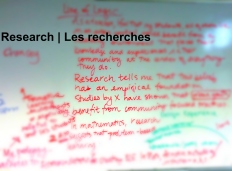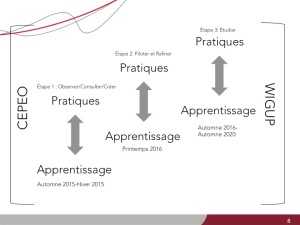Research
My research-focused activities are driven by a deep interest in the interactions of literacies development, technology and teaching.
I am interested in understanding the development of digital, academic literacies as children grow. Relatedly, I am interested in understanding the teaching methods that seem most supportive of the development of these literacies.
These first two areas of work emerge directly from my dissertation research. In that project, I designed a teaching intervention for Grade 9 students who were asked to conduct a series of online research activities, with a partner, on topics related to their science curriculum. Students then wrote a synthesized account of their learning, for a particular purpose and addressed to a particular audience. Although results must be interpreted cautiously because of the limited sample size, analyses indicated that treatment participants were more able to access background knowledge in their post-test writing and more able to integrate more pieces of information from a more divergent set of information sources than the treatment group participants. Because students engaged in a series of five research sessions during this study and I traced their strategy use during their online reading activities, I began to ask about the patterns and trajectories of emergence of synthesis skills, in particular.
I also study teacher professional practices with technologies. In this area, I have worked with many colleagues in the development of professional development experiences, and transformative Master’s-level courses in Educational Technology, both online and in face-to-face contexts.
- My CV is included below.
- You can also find a list of work that I have edited, written and published, or shared in some way.
- You can also find details below about a new five-year research project that I am starting with the Conseil des écoles publiques de l’Est de l’Ontario and WIGUP Corporation (en français seulement).
Selected Works [ordered by date]
Curriculum Vitae: Last Update October, 2015
Heintz, A., Hagerman, M.S., Boltz, L. & Wolf, L.G. (under review). Teacher awarenesses and blended instruction practices: Interview research with K-12 teachers. In K. Hourigan & A. Marcus-Quinn (Eds), Handbook for digital learning in K-12 schools. London: Springer.
Hagerman, M.S. (2015, October). The promise and pitfalls of strategies instruction for students engaged in complex inquiry-based activities online. 4T Virtual Conference on Digital Writing, Ann Arbor, MI. Link to Recording. http://www.4tdwvirtualcon.com/
Spiro, R.J., DeSchryver, M., Hagerman, M.S., Morsink, P.M., Thompson, P. (2015). Reading at a crossroads? Disjunctures and continuities in current conceptions and practices. New York: Routledge Taylor & Francis Group.
Hagerman, M.S. (2014). Disruptive promise: The LINKS intervention and its impact on multiple, multimodal Internet text integration. (Doctoral dissertation). Retrieved from ProQuest (1525819513). Hagerman, M.S. (2014) in .pdf
Hagerman, M.S. (May, 2014). Instruction that supports synthesis of multiple texts. Roundtable workshop presented at the International Reading Association Pre-Conference Institute on Intentional Teaching with Technology to Increase Understanding, Empathy and Engagement, New Orleans, LA. http://bit.ly/LRA2014_MSH
Hagerman, M.S. (2014, June). At the center of IT all: Scaffolding advanced information literacies for students in school libraries. Summer Institute of the Association of Independent School Librarians, John Bourroughs School, St. Louis, MO. http://sites.google.com/a/jburroughs.org/aisl_summer_institute/
Hagerman, M.S., Keller, A., & Spicer, J. (2013). Building skills and mindsets: The MSU educational technology certificate courses and their impact on teachers’ growth as technology integrators. TechTrends, 57(3), 26-33.
Hagerman, M.S. & White, A. (2013, December). What’s the best formula for enhancing online inquiry skills? [(PST)2 + (iC3)]. Reading Today, 20-21. Newark, DE: International Reading Association.
Hagerman, M.S., White, A., Lewis, C & Sherrieb, A. (2013, March). [(PST)2 + iC3] : A Formula for Online Inquiry and Synthesis. Paper presented at the meeting of the Michigan Reading Association, Grand Rapids, MI. http://pst2ic3.wordpress.com
Hagerman, M.S., Joseph, T., Pearson, C. & Steel, V. (2013, November). Yes, they can! Authentic summer learning through digital inquiry for at-risk readers. Presentation given at the Michigan Digital Learning Conference, Macomb County, MI. http://bit.ly/1DcsBGc
Hagerman, M.S., Morsink, P.M. & Hartman, D.K. (2012, December). Reading comprehension apps: How well do research and design align? Poster presented at the meeting of the Literacy Research Association, San Diego, CA. http://readingappmap.wordpress.com
Hartman, D.K., Morsink, P.M. & Hagerman, M.S. (2011, December). Overlapping waves of change: Six elementary teachers’ changing conceptions and practices of literacy as they learn to integrate technology. Poster session presented at the annual meeting of the Literacy Research Association, Jacksonville, FL. http://literacyconceptionsandpractices.wordpress.com/
Morsink, P.M., Hagerman, M.S., Heintz, A., Boyer, D.M., Harris, R., Kereluik, K., & Hartman, D.K. (2011). Professional Development to Support TPACK Technology Integration: The Initial Learning Trajectories of Thirteen Fifth- and Sixth-Grade Educators. The Journal of Education, 191 (2), 3-16.
Chaire de recherches WIGUP
Au mois d’octobre 2015, j’aborde un projet de recherches en partenariat avec le Conseil des écoles publiques de l’Est de l’Ontario et la compagnie, WIGUP Corp. Le projet vise à explorer les méthodes pédagogiques qui peuvent soutenir, chez les élèves de 9 à 13 ans, un cadre de compétences requises pour réussir à l’ère numérique. Ces compétences, selon plusieurs équipes (e.g.Collins & Halverson, 2009; Fullan, 2013; Hartman, Morsink & Zheng, 2013; Leu, Kinzer, Coiro, Castek & Henry, 2013; Partnership for 21st Century Learning, 2009) prépareront nos élèves à réussir dans un monde complexe:
- Les littératies numériques – et surtout la compréhension et la création de divers textes de diverses modalités
- La pensée critique — surtout en réponse aux défis complexes
- La collaboration
- L’innovation et la créativité
- S’investir dans l’action sociale
Références
Collins, A. & Halverson, R. (2009). Rethinking education in the age of technology: The digital revolution and schooling in America. New York: Teachers College Press.
Fullan, M. (2013) Great to excellent: Launching the next stage of Ontario’s education agenda. Retrieved from https://www.edu.gov.on.ca/eng/document/reports/FullanReport_EN_07.pdf
Hartman, D. K., Morsink, P. M., & Zheng, J. J. (2010). From print to pixels: The evolution of cognitive conceptions of reading comprehension. In E. A. Baker (Ed.), The new literacies: Multiple perspectives and practice (pp. 131–164). New York: Guilford Press.
Leu, D.J., Kinzer, C., Coiro, J., Castek, J., & Henry, L.A. (2013). New literacies: A dual-level theory of the changing nature of literacy instruction, and assessment. In D.E. Alvermann, N.J. Unrau, & R.B. Ruddell (Eds.) Theoretical models and processes of reading (6th ed., pp. 1150-1181). Newark, DE: International Reading Association
Partnership for 21st Century Learning (2009). Framework for 21st century learning. Washington, DC: P21. Retrieved from http://www.p21.org/our-work/p21-framework.

